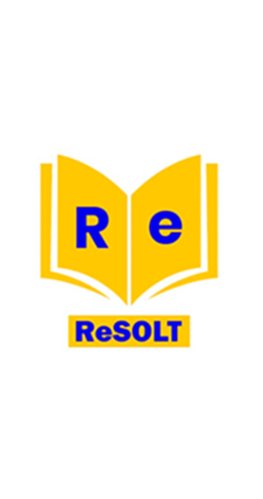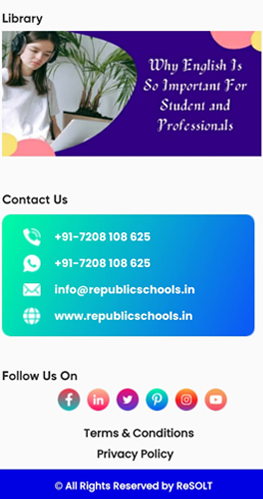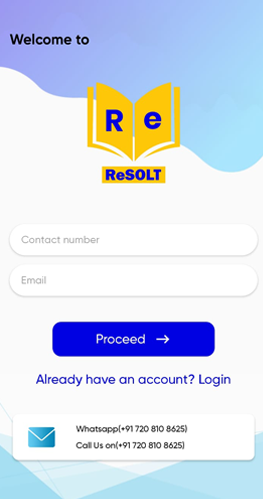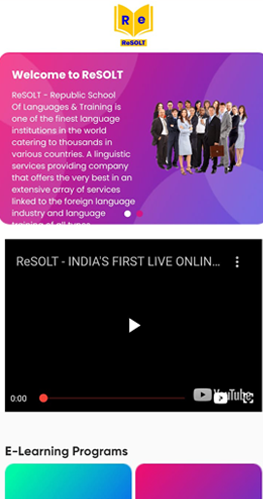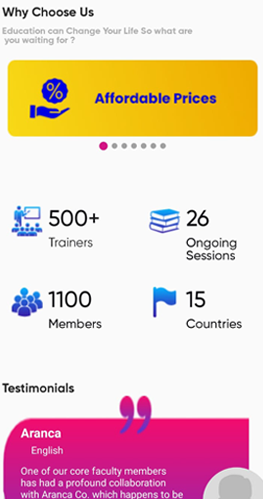Sample Video of Training Session






Courses

Courses

German Language Classes in Mumbai
For A1 level training syllabus please Click Here
Check our demo training video Click Here
Are you looking for German language classes in Mumbai? Learn German Language with ReSOLT Institute in Andheri, Dadar, & Mumbai by Experienced Trainers.
Our experienced and certified trainers will help you achieve your language learning goals. We offer group classes, private lessons, and corporate training.
German language, German Deutsch, official language of both Germany and Austria, and one of the official languages of Switzerland. German belongs to the West Germanic group of the Indo-European language family, along with English, Frisian, and German (Netherlandic, Flemish). Learn German language with a curriculum where you get the best German course available. Looking for the best German class then, just join us. The finest German classes are here waiting for you. Study German to unleash your true potential and accelerate your career growth.
ReSOLT is a renowned German institute in Mumbai, helping every individual to become fluent in German. So attend German classes and learn German from our highly experienced German trainers. With our German Language courses in Mumbai, you can easily learn daily use words, grammar, etc.
History
The recorded history of Germanic languages begins with their speakers’ first contact with the Romans, in the 1st century BCE. At that time and for several centuries thereafter, there was only a single “Germanic” language, with little more than minor dialect differences. Only after about the 6th century CE can one speak of a “German” (i.e., High German) language. German is an inflected language with four cases for nouns, pronouns, and adjectives (nominative, accusative, genitive, dative), three genders (masculine, feminine, neuter), and strong and weak verbs. Altogether, German is the native language of more than 90 million speakers and thus ranks among the languages with the most native speakers worldwide. German is widely studied as a foreign language and is one of the main cultural languages of the Western world.As a written language, German is quite uniform; it differs in Germany, Austria, and Switzerland no more than written English does in the United States and the British Commonwealth. As a spoken language, however, German exists in many dialects, most of which belong to either the High German or Low German dialectal groups. The main difference between High and Low German is in the sound system, especially in the consonants. High German, the language of the southern highlands of Germany, is the official written language. Alemannic dialects, which developed in the southwestern part of the Germanic speech area, differ considerably in sound system and grammar from standard High German. These dialects are spoken in Switzerland, western Austria, Swabia, and Liechtenstein and in the Alsace region of France. Yiddish, the language of the Ashkenazic Jews (Jews whose ancestors lived in Germany in the European Middle Ages), also developed from High German.
Reasons to Learn German Language

1. Most widely spoken native language in Europe
German (Deutsch) is the most widely spoken mother tongue in Europe. Germany is not the only country where it is spoken. It is the official language of Germany, Austria, Switzerland, Liechtenstein, Belgium, and Luxembourg. There are sizable German-speaking populations in North Italy (South Tyrol), Poland, Hungary, Denmark, Bosnia and Herzegovina, Namibia, Russia, Romania, Czech Republic, and other parts of Europe.It is spoken by over 100 million native speakers and a total of 185 million speakersworldwide.It is also one of the most popular foreign language taught worldwide.It is also a lingua franca of Central and Eastern Europe.
2. Job opportunities worldwide
Career is one of the most important motivators for foreign language learning. It is Europe’s largest economy, fourth-largest by nominal GDP in the world, the world’s second-largest exporter, which makes it an essential language to study. They are world leaders in engineering. Fluency in the German language in India has opened up job possibilities in medicine and healthcare, education, logistics, automobile, power and utility, mass media, entertainment, tourism, information technology, financial services, outsourcing, etc. Germany powerhouses like BMW, Volkswagen, Bosch, Daimler, Adidas, Allianz, Deutsche Bank, Siemens, SAP, BASF, and Lufthansa are all established around the world. Having German language skills on your CV can help your career in many of these International corporations.
3. Career Scope of German in India
Several international companies that have set up their businesses in India are looking for those who are fluent in the German language in India. It increases your job opportunities with German and foreign companies in India and abroad. Professional German Translators, Interpreters, proofreaders, and content writers, and trainers are always in demand. One can also look forward to jobs in the German embassy in New Delhi and consulate in Mumbai, Chennai, Kolkata, and Bangalore. The Scope of the German language is on rising. Many MNCs such as Amazon, Accenture, BMW, Siemens, Volkswagen, HP, Audi, Oracle, Samsung, Hyundai, LG, Thomson, Axa, GE, etc. are employing German language experts for outsourcing and offshore work.
4. Study / Work in Germany, Austria, Switzerland
Germany is the land of ideas and innovations. Once you learn German Language, the country offers a wide variety of courses spread across various bachelors, masters, doctoral, and post-doctoral programs. Employers around the world respect their degrees. Germany’s universities have an excellent international reputation and among the best in the world. You will earn an internationally renowned degree, giving you excellent prospects on the global job market.Since the states fund higher education in the country, hence, the vast majority of Germany’s academic institutions are free for students, even international students.
5. German in Hotel, Travel, Tourism and Hospitality industry
Thanks to the strong economic growth and low unemployment, Germans make good money and are entitled to 6 weeks of vacation a year. No surprise, they are the world’s most significant spenders tourist dollars in the world. They are everywhere and travel all over the world – Africa, Asia, and the Americas. Wherever you go in Europe, North America, and other parts around the world, you are sure to encounter Germans speakers. There are millions of German-speaking visits India every year for sightseeing but aren’t fluent in English. The fluency in this west Germanic language increases the Career scope in hospitality travel, leisure, and tourism sector.If the travel agencies, tour companies, tour guides, hotels, airlines, and car rental agencies can communicate with them in their language will win their business. While one can visit Germany, Austria, Switzerland, and other Central and Eastern European countries without speaking a word in German. Knowing the language makes travel more meaningful for everyone involved. By speaking the language, you will not only enjoy to the fullest and earn their appreciation but also opens the door to a genuine interaction and connection.
6. The German language is popular in India
Some people might think about why to study a popular one? An important reason to learn?
Well. Think about German (another West Germanic language and lingua franca in the Netherlands, Belgium, the Caribbean Islands, etc.). Currently, there is no program in the German language in India.
Not at any Indian university or private institute, as far as I am aware.
If you desire to learn German, you have limited options when it comes to books, teachers, or even speakers. It can rapidly become frustrating when you feel like your progress is stagnating for lack of enough resources. German is the second most popular foreign language in India after French. One main reason is the “First Move advantage.” It is because their government initiated to promote German in India several decades back.
The first “Max Mueller Bhavan” was inaugurated in Kolkata in 1957.
In fact, The first German lessons in India were imparted in Pune and Mumbai in 1914 (more than a century back).
Since it is the second most learned foreign language in India, you will find a colossal number of study material or resources to acquire this fascinating language.There are 100’s of schools, colleges, universities, and language institutes, including Max Mueller Bhavan (affiliated to German Embassy), offer German classes in Delhi and other parts of India. Besides, finding a teacher is also not a difficult task, at least in major cities like Delhi/NCR, Mumbai, Chennai, Bangalore, Hyderabad, Pune, etc.
7. The World of Literature, Music, Movie, Art, and Philosophy
The German-speaking world has also produced some of the greatest literary, musical, artistic, theatre, and philosophical minds in human history. Many important works are written in German and continue to be produced in the same. Germany and Austria are also famous for their great music and movie. Proficiency in German allows you to appreciate the masterpieces of these artists in their original and unfiltered form. German speakers produce nearly 80,000 new book titles each year. It is ranked number 5 in terms of the annual publication of new books. Knowledge of this language, therefore, offers you an insight into the way of life, and the hopes and dreams of people in German-speaking countries, broadening your horizon.
8. Interested in Science and Technology?
It is the second most commonly used scientific language. With over 250,000 scientists working in Germany, it is the third-largest contributor to research and development and offers research fellowships to scientists from abroad. More than one hundred Nobel Prizes have gone to brilliant Germans for accomplishments in Science, namely physics, medicine, chemistry, and other areas. No surprise, it is the second-most innovative country in the world. Einstein, Kepler, Röntgen, Planck, Virchow are some of the greatest scientists from the German-speaking world. Throughout history, their scientists have proven themselves time and again to be great innovators. That trend continues today.
9. German strong presence on the Internet
Germans have a dominant Internet presence.
With 17 million Internet domains, Germany’s top-level country domain .de is the 4th most popular extension after .com, .ru (Russia) and .jp (Japan). After English and Russian, It is one of the top languages written on the Internet.
Since a wide range of critical websites is in German and worldwide, Knowledge of German, thus, offers you extended access to information. It also gives you access to an additional 17 million websites and does not even count the German sites ending in .com, .net, .org, and .info. and many others.
10. German is Not so difficult
German and English belong to the same language family tree, i.e., West Germanic language family. If you know English, German, or any Scandinavian languages and planning to learn it, you’re at an advantage.
Both share thousands of similar words and phrases, which are closely related known as “cognates.” The Hello becomes Hallo. Water becomes Wasser, and father turns into Vater, Friend is Freund, and so on. Not so hard, after all, is it?
Many think it is a difficult one.
Well, I believe all language is harder or easier to learn.
If you have passion and interest and are ready to give enough time and effort, you will achieve German language proficiency test B2/C1 in 2-3 years. All that is needed is a little persistence and the right approach!
Levels of German taught at ReSOLT
1. Elementary use of language ( A1 )
This level improves language comprehension through improved speaking and listening abilities. It includes additional grammar topics such as conjunctions, relative sentences, simple past tense, and adjective endings. There’s also a new vocabulary set introduced. Additionally, we emphasize revisiting topics from level A1 to facilitate a seamless transition.
2. Elementary use of language ( A2 )
In this level, you’ll improve your language skills by becoming better at speaking and listening. We’ll cover new grammar topics like conjunctions, relative sentences, simple past tense, and adjective endings. You’ll also learn new vocabulary. We’ll also review topics from level A1 to help you transition more smoothly.
3. Independent language use ( B1 )
This level will help you become more confident in conversations and fully understand long texts. You’ll learn how to debate various topics and understand radio interviews. These skills are highly sought after in German universities. We’ll cover grammar topics like double conjunctions, relative sentences, passive voice, past perfect tense, future tense, synonyms, antonyms, and vocabulary.
4. Independent language use ( B2 )
This level helps you speak confidently and fluently, taking your language skills to a more professional level. It also makes listening and understanding easier. The grammar builds upon what you learned in B1, focusing on finer details.
5. Autonomous language ability ( C1 )
Can understand a wide range of challenging, longer texts and also grasp implicit meanings. Can express him/herself spontaneously and fluently without having to search for words frequently and noticeably. Can use the language effectively and flexibly in his/her social and professional life or in training and studies. Can make clear, structured and detailed statements on complex topics and apply various means of text association appropriately in the process.
6. Autonomous language ability ( C2 )
Can effortlessly understand practically everything which he/she reads or hears. Can summarize information from various written and spoken sources, logically recounting the reasons and explanations. Can express him/herself spontaneously with high fluency and precision and also make finer nuances of meaning clear in more complex topics.
Foreign Language institute that conducts the exam
Goethe-Institute
The Goethe-Institute , is a non-profit German cultural association operational worldwide with 159 institutes, promoting the study of the German language abroad and encouraging international cultural exchange and relations. Around 246,000 people take part in these German courses per year.The institute has developed a series of exams for learners of German as a foreign language (Deutsch alsFremdsprache, DaF) at all levels: A1 up to C2. These can be taken both in Germany and abroad and have been adapted to fit into the Common European Framework of Reference for Languages (CEFL), the standard for European language testing. There is also one exam, the GroßesDeutschesSprachdiplom, which is at a higher level than the highest CEFL level.[12] Below is a table of the basic Goethe-Institut exams as they fit into the scheme
International Exam Preparatory Course
The Zertifikat Deutsch (ZD) is an international exam for German proficiency. It’s designed for non-native speakers to assess their language skills. The exam is a collaboration between the Goethe Institute, Österreichischem Sprachdiplom, the Schweizer Erziehungsdirektorenkonferenz, and WBT Weiterbildungs-Testsysteme gGmbH.
These exam levels align with the Common European Framework of Reference (CEFR). Depending on your needs, there are different types of exams available. Other notable exams include Zertifikat Deutsch für den Beruf (ZDfB) and Test Deutsch als Fremdsprache (TestDaF), both internationally recognized for German proficiency. However, ZD remains the most widely accepted international exam for German.
Why is learning German beneficial?
1. Most Spoken Language
German is widely spoken across Europe and serves as the second native language in several countries like Germany, Austria, Switzerland, Luxembourg, and Liechtenstein.
2. Foreign Investment
Germany is a major player in exports, trading extensively within Europe and globally, particularly with the United States, where over 2000 US companies engage in trade with German-speaking countries.
3. Academic Prospects
The German government provides numerous scholarships and support for foreign students, offering quality education across various fields and sometimes even holiday working visas.
4. Business
Knowing German is advantageous in business settings as it avoids misunderstandings that can occur with interpreters and facilitates effective communication with German-speaking business partners, who often prefer dealing with personnel fluent in their language.
5. Research & Scientific Progress
A significant amount of scientific research is published in German, contributing significantly to global scientific progress. Accessing this research directly can be beneficial as some information may be lost in translation from German to English.
6. Employment Prospects
German proficiency opens up employment opportunities, especially in the hospitality and tourism industry, given its widespread use as a second language in many European and non-European countries and among world travelers. Germany, being technologically advanced, also offers prospects in various sectors.
Time Table
Week Days
| MONDAY | WEDNESDAY | FRIDAY |
|---|---|---|
| 08:30 am to 10:30 am | 08:30 am to 10:30 am | 08:30 am to 10:30 am |
| 10:00 am to 12:00 pm | 10:00 am to 12:00 pm | 10:00 am to 12:00 pm |
| 02:00 pm to 04:30 pm | 12:00 pm to 02:00 pm | 12:00 pm to 02:00 pm |
| 04.00 pm to 06.00 pm | 02.00 pm to 04.00 pm | 02.00 pm to 04.00 pm |
| 06.00 pm to 08.00 pm | 04.00 pm to 06.00 pm | 04.00 pm to 06.00 pm |
| 06.00 pm to 08.00 pm | 06.00 pm to 08.00 pm |
| TUESDAY | THURSDAY | SATURDAY |
|---|---|---|
| 08:30 am to 10:30 am | 08:30 am to 10:30 am | 08:30 am to 10:30 am |
| 10:00 am to 12:00 pm | 10:00 am to 12:00 pm | 10:00 am to 12:00 pm |
| 02:00 pm to 04:30 pm | 12:00 pm to 02:00 pm | 12:00 pm to 02:00 pm |
| 04.00 pm to 06.00 pm | 02.00 pm to 04.00 pm | 02.00 pm to 04.00 pm |
| 06.00 pm to 08.00 pm | 04.00 pm to 06.00 pm | 04.00 pm to 06.00 pm |
| 06.00 pm to 08.00 pm | 06.00 pm to 08.00 pm |
Week Ends
| SATURDAY / SUNDAY | ONLY SATURDAY | ONLY SUNDAY |
|---|---|---|
| 04:00 pm to 07:00 pm | 11:30 am to 02:30 pm | 08:30 am to 10:30 am |
| 06:00 pm to 08:00 pm | 02:30 pm to 05:30 pm | 11:30 am to 02:30 pm |
| 02:30 pm to 05:30 pm |
Time Table
Week Days
| MONDAY | WEDNESDAY | FRIDAY |
|---|---|---|
| 08:30 am to 10:30 am | 08:30 am to 10:30 am | 08:30 am to 10:30 am |
| 10:00 am to 12:00 pm | 10:00 am to 12:00 pm | 10:00 am to 12:00 pm |
| 02:00 pm to 04:30 pm | 12:00 pm to 02:00 pm | 12:00 pm to 02:00 pm |
| 04.00 pm to 06.00 pm | 02.00 pm to 04.00 pm | 02.00 pm to 04.00 pm |
| 06.00 pm to 08.00 pm | 04.00 pm to 06.00 pm | 04.00 pm to 06.00 pm |
| 06.00 pm to 08.00 pm | 06.00 pm to 08.00 pm |
| TUESDAY | THURSDAY | SATURDAY |
|---|---|---|
| 08:30 am to 10:30 am | 08:30 am to 10:30 am | 08:30 am to 10:30 am |
| 10:00 am to 12:00 pm | 10:00 am to 12:00 pm | 10:00 am to 12:00 pm |
| 02:00 pm to 04:30 pm | 12:00 pm to 02:00 pm | 12:00 pm to 02:00 pm |
| 04.00 pm to 06.00 pm | 02.00 pm to 04.00 pm | 02.00 pm to 04.00 pm |
| 06.00 pm to 08.00 pm | 04.00 pm to 06.00 pm | 04.00 pm to 06.00 pm |
| 06.00 pm to 08.00 pm | 06.00 pm to 08.00 pm |
Week Ends
| SATURDAY / SUNDAY | ONLY SATURDAY | ONLY SUNDAY |
|---|---|---|
| 04:00 pm to 07:00 pm | 11:30 am to 02:30 pm | 08:30 am to 10:30 am |
| 06:00 pm to 08:00 pm | 02:30 pm to 05:30 pm | 11:30 am to 02:30 pm |
| 02:30 pm to 05:30 pm |
Duration
| SATURDAY / SUNDAY | ONLY SUNDAY | WEEKDAYS |
|---|---|---|
| 2 Months | 3 Months | 2 Months |
Exam Preparation
We prepare you for Goethe Institute Certification.
Facilities

World’s Top Trainers

Affordable Fees

Flexible Timings

Live Online Learning

Offline Classes

Personal Attention

Digital Study Material

Creative Exercises

Doubt Solving & Revision

Corporate Training Programs















